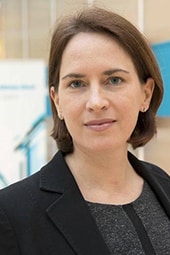
Valerie Bannert-Thurner, head of the buy-side and sell-side solutions business within Market Technology at Nasdaq, said the division is experiencing an upward swing across asset classes and geographies.
Last month Nasdaq and Deutsche Bank signed an agreement for the US exchange to deliver technology and operational services for the bank’s US-based single dealer platform which is due to go live in the third quarter of this year.
Nicolas Balatsos, chief operating officer of Americas equity trading and equity sales at Deutsche Bank, said in a statement: “The single dealer platform represents our further investment in electronic execution. Combined with our ability to warehouse and manage risk efficiently, the platform creates an attractive liquidity offering for our clients that is unique to Deutsche Bank.”
? NEWS ALERT: Nasdaq to deliver technology and operational services to power Deutsche Bank’s new US Single Dealer Platform https://t.co/e6Lmd8twpb
— Nasdaq Tech (@NasdaqTech) March 28, 2019
Carl Slesser, vice president, Market Technology at Nasdaq, told Markets Media that the exchange will fully host Deutsche’s single dealer platform, not just the matching engine.
“For example, Nasdaq will also manage the system’s operations, including portions of risk controls, venue surveillance and trade reporting,” he added. “We provide end-to-end support.”
Slesser continued that Nasdaq Market Technology already hosts Goldman Sachs’ dark pool for US equities and a foreign exchange single dealer platform in New York, London and Tokyo for a global market participant. He added that Nasdaq Market Technology can support all asset classes.
Last year the exchange launched its Nasdaq Financial Framework technology into the banks and brokers segment for complete outsourcing of trading infrastructure and operations, including regulatory reporting and as a complement to its risk and surveillance technology offering.
Lars Ottersgård, executive vice president and head of Market Technology at Nasdaq, said in a statement at the time: “With the Nasdaq Financial Framework, we are now able to extend the same exchange-grade technology and support used by our market operator clients to the sell-side, who are facing increased operational requirements and regulatory demands.”
Joséphine de Chazournes, senior analyst at consultancy Celent, said in a report last year that the sell side has been forced to make investments which provide a high return while outsourcing commoditized and non-core services.
“Regulatory oversight of running a platform is in Nasdaq’s DNA,” Slesser added. “For the sell side investing in technology is not just a one-off as they have to keep up with latest regulation and constantly improve latency.”
Slesser continued that Nasdaq initially focussed on launching the Financial Framework in the US but the exchange is now having discussions in Europe and interest is increasing in Asia.
Bannert-Thurner said Market Technology aims to provide a suite of services to banks and the buy side across the value chain from the front to back office.
She said fund managers are showing increasing interest in using the risk and surveillance technology offerings in the Financial Framework.
“I would not be surprised to see the buy-side also eventually outsourcing their trading desks,” she added.
Buy-side outsourcing
Consultancy Opimas has estimated that by 2022 about one fifth of investment managers with assets under management of more than $50bn will outsource some portion of their trading desks. Opimas predicted that revenue growth will be in the range of 20% to 30% annually for the next few years for these services.
Octavio Marenzi, chief executive of Opimas, said in a report in February that large, established asset managers are considering outsourcing all or part of their trading desk to an external provider.
“The basic rationale for outsourcing revolves around reduced operational costs and improved execution quality,” he added. “While improvements in execution quality in the range of 15 to 20 basis points have been demonstrated, this is typically only for very small funds that do not have the necessary scale to deploy highly professional traders and systems.”
Opimas found that the reduction in operational costs is far more important than execution quality.
Marenzi continued: “Asset managers looking at providers to outsource their trading desks to should consider regional coverage, instrument coverage, number of traders and experience in instrument class, number of similar clients, number of connections to relevant brokers and execution venues, systems architecture, including review of the order management and execution management systems in place, system used for transaction cost analysis, review of historical execution quality, commission management programme, trade allocation policy, and any conflicts that the provider may have, including proprietary trading or asset management.”









